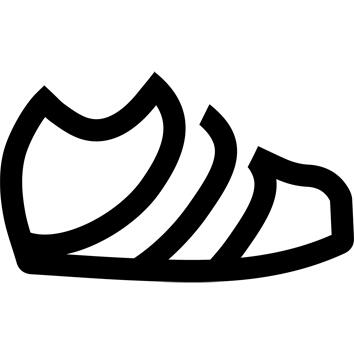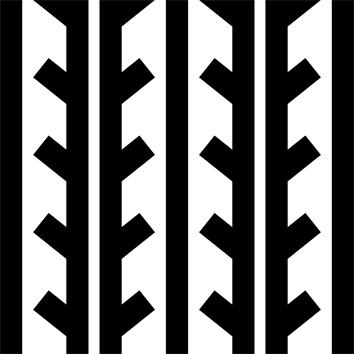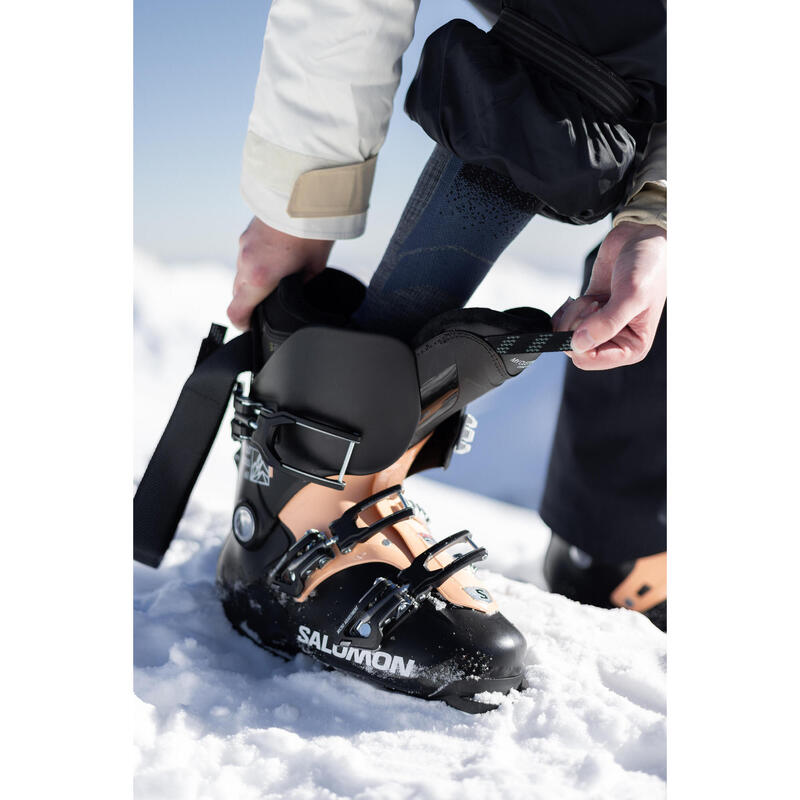EXPERIENCE
The Salomon QST Access 60 is one of the most flexible and comfortable boots on the market. It's ideal for beginner or recreational skiers whose priority is comfort and ease. Equipped with a ski/walk position and a notched sole, it's ideal for unstressed days on the slopes.
HOOK ADJUSTMENT
This shoe features 3 aluminum micro-metric hooks. You can adjust the length of the buckle by screwing or unscrewing the hook. The top hook has 3 positions to suit all calves. A wide strap provides powerful, easy tightening of the upper shell.
PUTTING ON AND TAKING OFF
The ski/walk position obviously makes walking easier. This system also has the advantage of being efficient when putting on/removing boots. In the walking position, the opening is larger, making it easier to put on/remove the foot.
What is flex?
To give an indication of the shoe's rigidity, brands define a Flex index for each shoe. This number determines the boot's rigidity: the higher the value, the stiffer the shell. A flex of 60 or less is considered suitable for beginners. A flex of 60 to 90 is for advanced skiers. Beyond that, products are designed for expert skiers. However, larger skiers can move up a level.
What is my shoe size?
Ski boot sizes are expressed in Mondopoint sizes. This is the length of the foot in cm.
Place your heels against a wall, slide a sheet of paper underneath, bend over and measure the longest foot.
For example, if your foot is 27.2cm long, you should choose size 27/27.5.
A size 27 boot is exactly the same as a 27.5.
How do you know if the shoe you're trying on is the right size?
With your foot in the shoe, close the hooks halfway. Can you go any further? This means that the shoe's volume doesn't suit you. Once your shoes are closed, perform 3 flexions. Stand up straight: Your toes should touch the toe of the shoe. As you flex, your foot should move backwards and you should no longer feel the toe. Bear in mind, too, that after a few days' skiing, the boot's foam will settle.
What to do about foot pain
1- Choose a thin, technical ski sock to avoid pressure points and promote blood circulation in the foot.
2- Choose a sole adapted to the shape of your foot to prevent it from crushing against the shell. Ask a sales assistant for advice.
How do I store my ski boots?
1- Aerate your shoes by removing the liner inside the plastic shells.
2- Close the hooks at the first notch to prevent the shoes from deforming and, if possible, store them in a cover.
3- Store them, if possible, in a dry place where the temperature is unlikely to fall below 10°C. The shoe's plastic will thank you!
How do I try on a ski boot?
Once the foot is in the shoe, close the hooks halfway. Can you go any further? This means that the shoe's volume doesn't suit you. Once your shoes are closed, perform 3 large flexions by pressing hard on your shins (put your hands on your knees) to move your heel back into the shoe. Stand up straight: you should be able to touch the tip of the shell. When flexing, your foot should move backwards and you should no longer be able to feel the toe.
How to keep your feet warm?
Often overlooked, drying the liner is the most important step in keeping feet warm. Even at -10°C, the foot perspires and the liner can't dry on its own in its plastic shell, even over several days. Ideally, you should take them out every day. You can also use shoe dryers, which are much more practical, as you don't need to take the slipper out - just plug them in!
Is my liner thermoformable, and what is the purpose of thermoforming?
The Salomon Quest liner is thermoformable at the malleoli and forefoot.
At these points, the foam can heat up to take on the shape of your feet and the shell of the shoe. This enhances foot-insole-shell compatibility, and reduces discomfort points.











